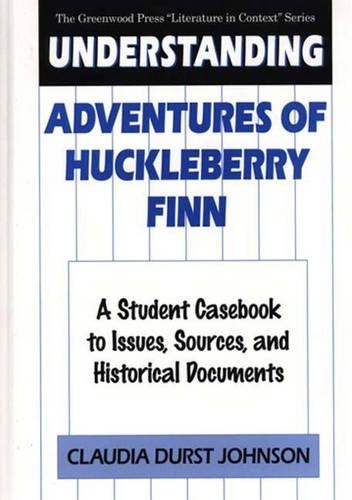
Understanding Adventures of Huckleberry Finn: A Student Casebook to Issues, Sources, and Historical Documents
(Hardback)
Publishing Details
Understanding Adventures of Huckleberry Finn: A Student Casebook to Issues, Sources, and Historical Documents
By (Author) Claudia Durst Johnson
Bloomsbury Publishing PLC
Greenwood Press
24th June 1996
United States
Classifications
Tertiary Education
Non Fiction
Literary studies: c 1800 to c 1900
813.4
Physical Properties
Hardback
264
Description
Since the time of its publication in 1884, "Adventures of Huckleberry Finn" has generated heated controversy. One of the most frequently banned books in the history of literature, it raises issues of race relations, censorship, civil disobedience and adolescent group psychology as relevant today as they were in the 1880s. This collection of historical documents, collateral readings and commentary captures the stormy character of a slave-holding frontier on the eve of war and highlights the legacy of past conflicts in contemporary society. Among the source materials presented are: memoirs of fugitive slaves, a river gambler, a gunman, and Mississippi Valley settlers, the Southern Code of Honor, rules of duelling and an interview with a 1990s gang member. These materials aim to promote interdisciplinary study of the novel and raise the student's understanding of the issues raised. The work begins with a literary analysis of the novel's structure, language and major themes and examines its censorship history, including recent cases linked to questions of race and violence. A chapter of censorship and race offers a variety of opposing contemporary views on these issues as raised in the novel. The memoirs in the chapter "Mark Twain's Mississipi Valley" illuminate the novel's pastoral view of nature in conflict with a violent civilisation resting on the institution of slavery. "Slavery, Its Legacy and Huck Finn" features the 19th-century pro-slavery arguments, firsthand accounts of slavery, the text of the Missouri compromise of 1820 and the Fugitive Slave Law of 1850. Each chapter closes with study questions, student project ideas and sources for further reading.
Reviews
Although this guide opens with the expected literary analysis, it quickly expands its scope with discussions of censorship, racism, and life in Mark Twain's America. Each chapter is supported by documents and readings that add to the understanding of the novel's complex social and political issues....Johnson balances the 19th-century topics with contemporary counterparts whenever possible; for example, a 1995 interview with a former gang member complements the section on codes of honor in Twain's time. Sugggestions for projects, classroom discussions, and additional reading follow each chapter. A valuable resource for teachers and serious students.-School Library Journal
Few students or teachers would deny the enormous advantages of studying works of literature in their literary, historical and cultural contexts. Claudia Durst Johnson's casebook on Huckleberry Finn highlights both the greatness of this literary classic as well as the controversy which has surrounded it since its publication in 1884.... Johnson provides a solid overview of the novel's major themes and offers commentary and supplementary material on key contextual issues... The strength of this volume lies in the intelligent selection of primary source material.... This is a most useful volume in a very important series.-Catholic Library World
"Few students or teachers would deny the enormous advantages of studying works of literature in their literary, historical and cultural contexts. Claudia Durst Johnson's casebook on Huckleberry Finn highlights both the greatness of this literary classic as well as the controversy which has surrounded it since its publication in 1884.... Johnson provides a solid overview of the novel's major themes and offers commentary and supplementary material on key contextual issues... The strength of this volume lies in the intelligent selection of primary source material.... This is a most useful volume in a very important series."-Catholic Library World
"Although this guide opens with the expected literary analysis, it quickly expands its scope with discussions of censorship, racism, and life in Mark Twain's America. Each chapter is supported by documents and readings that add to the understanding of the novel's complex social and political issues....Johnson balances the 19th-century topics with contemporary counterparts whenever possible; for example, a 1995 interview with a former gang member complements the section on codes of honor in Twain's time. Sugggestions for projects, classroom discussions, and additional reading follow each chapter. A valuable resource for teachers and serious students."-School Library Journal
Author Bio
CLAUDIA DURST JOHNSON is Professor of English at the University of Alabama, where she chaired the Department of English for 12 years. She is series editor of the Greenwood Press Literature in Context series, which includes her works Understanding To Kill a Mockingbird (1994) and Understanding the Scarlet Letter (1995). She is also the author of To Kill a Mockingbird: Threatening Boundaries, (1994), The Productive Tension of Hawthorne's Art (1981), and American Actress: Perspectives on the Nineteenth Century (1984), and coauthor (with Vernon Johnson) of Memoirs of the Nineteenth-Century Theatre (Greenwood, 1982) and (with Henry Jacobs) An Annotated Bibliography of Shakespearean Burlesques, Parodies, and Travesties (1976), as well as numerous articles on American literature and theatre.
